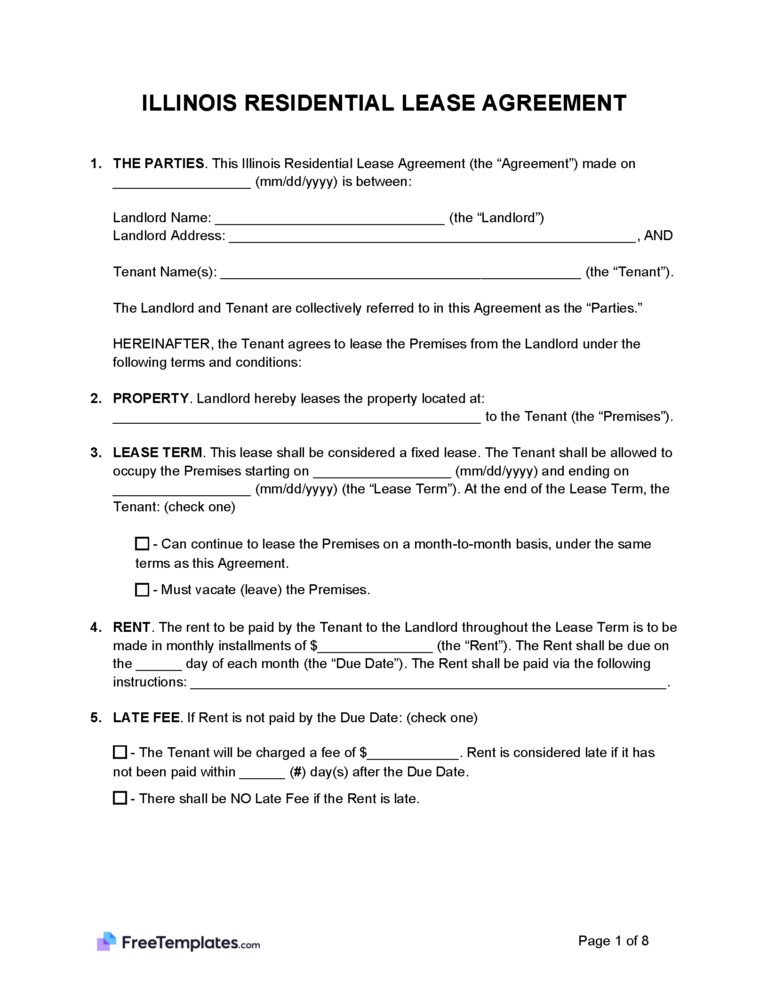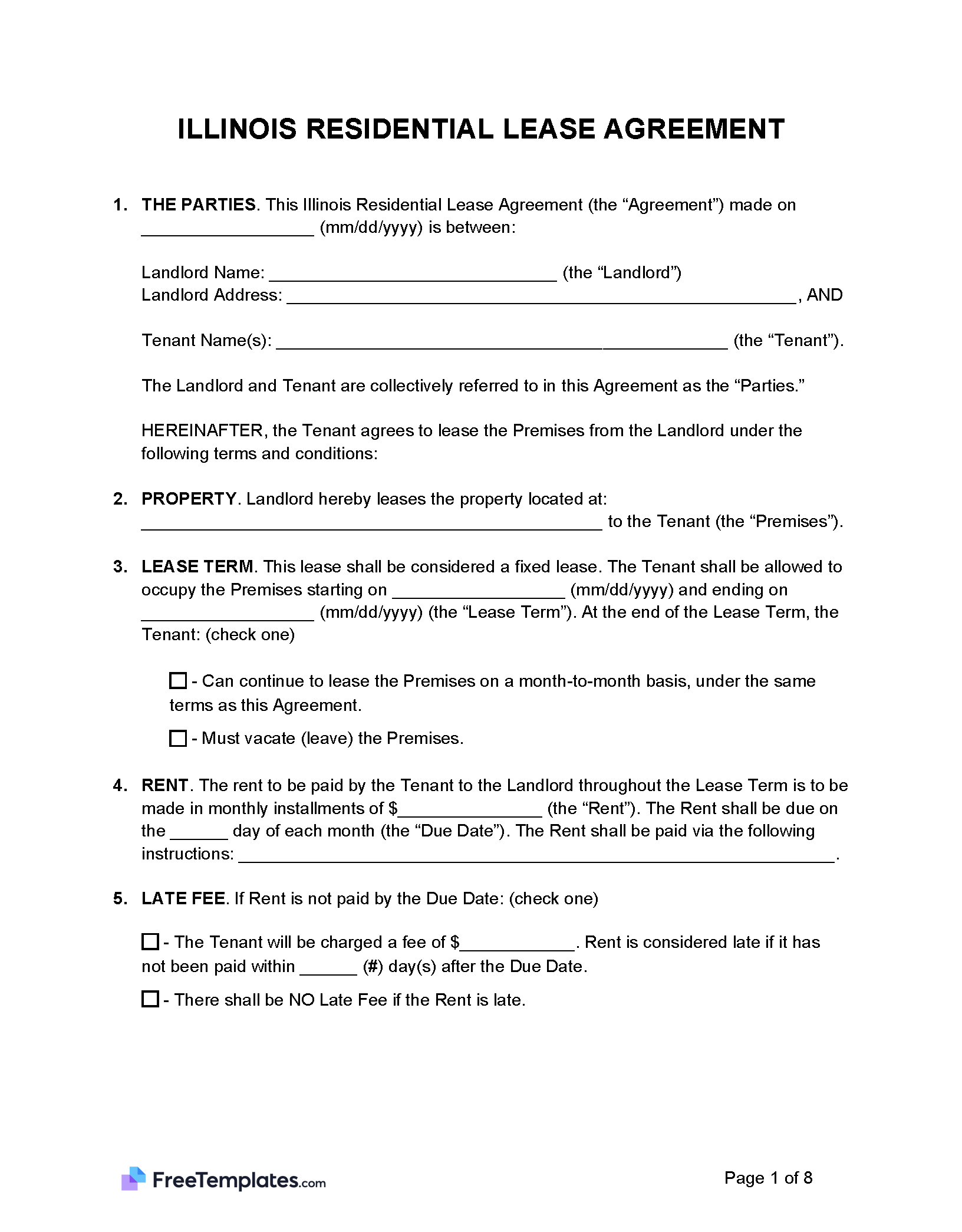By Type (7)
| Standard Lease Agreement – A fixed-term rental contract for a residential dwelling in Illinois. |
| Standard Lease Agreement (Chicago).- A fixed-term rental arrangement for a residential unit in Chicago. |
| Commercial Lease Agreement – A legal document for a business to rent a property from a landlord for commercial purposes. |
| Month-to-Month Lease Agreement – A legally binding arrangement in which a tenant rents a property monthly from a landlord, providing a short-term housing solution. |
| Rent-to-Own Agreement – A formal document that outlines the terms and conditions of purchasing a property, in which the tenant agrees to buy the rental after a disclosed amount of time. |
| Roommate Agreement – A contract signed by individuals sharing a residence, outlining the responsibilities and terms of their cohabitation. |
| Sublease Agreement – With the landlord’s permission, the tenant can rent out all or part of their tenancy to a new tenant while still remaining responsible for the original lease agreement. |
Disclosures (6)
Carbon Monoxide Detectors – The landlord must provide a carbon monoxide detector within 15 feet of where the tenant(s) sleep and provide information on the detectors in the lease. (Illinois Public Act 094-0741)
Concession Granted – Whenever there is an agreement to reduce the rent or fees as an incentive for the tenant to sign or renew the lease, the landlord must disclose the concession on the lease document as a header, “Concession Granted,” which should be at least 1.50 inches in height on the page. (765 ILCS 730/2)
Lead-Based Paint Disclosure – For properties built before 1978, landlords must provide information or a pamphlet about the dangers of lead-based paint.
Radon Hazard – At the time of application, the landlord must provide the Illinois Emergency Management Agency pamphlet, Radon Guide for Tenants, any reports of harmful radon levels in the dwelling, and the Disclosure of Information on Radon Hazards to the tenant. The tenant then has 90 days from the lease’s start to perform their radon testing. The tenant may terminate the lease if the test comes back higher than the recommended allowance. (420 ILCS 46/26)
Shared Meter – If the tenant pays a portion of a common meter, the landlord must disclose how the costs are calculated in writing. (765 ILCS 740/5)
Smoke Detectors – Landlords must ensure that the rental property has working smoke detectors at the start of the lease. Smoke detectors must be within 15 feet of every room used for sleeping and on every floor, excluding unoccupied attics. However, once the lease begins, the tenant must maintain the smoke detectors to ensure functionality. (425 ILCS 60(3))
Security Deposit
Maximum Amount – Illinois sets no limit to the amount a landlord can charge for a security deposit.
Collecting Interest – If the landlord owns more than 25 rental units, they must put the security deposit in an interest-bearing account that matches the interest rate of the previous calendar year on December 31. The landlord must pay the interest made within 30 days after the end of each 12-month rental period if the interest accumulated for the previous year is $5 or more. (765 ILCS 715)
Returning to Tenant – The landlord must return the security deposit and any unpaid interest, regardless of the amount, if applicable, to the tenant within 30 days of the termination of the lease. (765 ILCS 710/1)
Landlord Access
General Access – There are no regulations regarding when a landlord can enter a rental property in Illinois. It is recommended that the landlord give the tenant written notice.
Emergency Access – In case of emergency, the landlord can enter the rental premises at any time without notice.
Paying Rent
Grace Period – Illinois institutes a 5-day grace period for rent. (770 ILCS 95/7.10)
Maximum Late Fee – The landlord must wait until the 6th day to issue a late fee. The landlord may collect a reasonable late fee unless otherwise disclosed in the lease agreement. $20 or 20% of the rent is deemed reasonable. (770 ILCS 95/7.10)
Returned Checks (NSF) – A landlord can charge a tenant $25 if their check is returned for insufficient funds. (810 ILCS 5/3-806)
Reasons for Eviction (2)
Non-Payment of Rent – If rent is not paid after Illinois’ 5-day grace period, the landlord can begin eviction proceedings with a 5-day notice to pay or vacate the property. Only a full payment within the time frame will void the eviction action. (735 ILCS 5/9-209)
Non-Compliance – If the tenant breaks any lease agreement terms, the landlord can give a 10-day notice to quit the tenancy and begin eviction proceedings. (735 ILCS 5/9-210)

